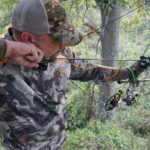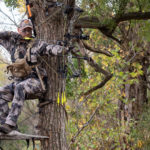For many states, turkey season seems to end as quickly as it started. But if there’s still time on the clock where you live, and you still have a tag in your pocket, now is the time to make your move. But the late season can be tough. Turkeys don’t tolerate hunting pressure very well. By the late season, their patterns, activities, and favorite hangouts have likely changed a dozen times.
So how will you score in the late season? We reached out to some of our turkey hunting friends for a closer look at their favorite late season turkey tactics for success.
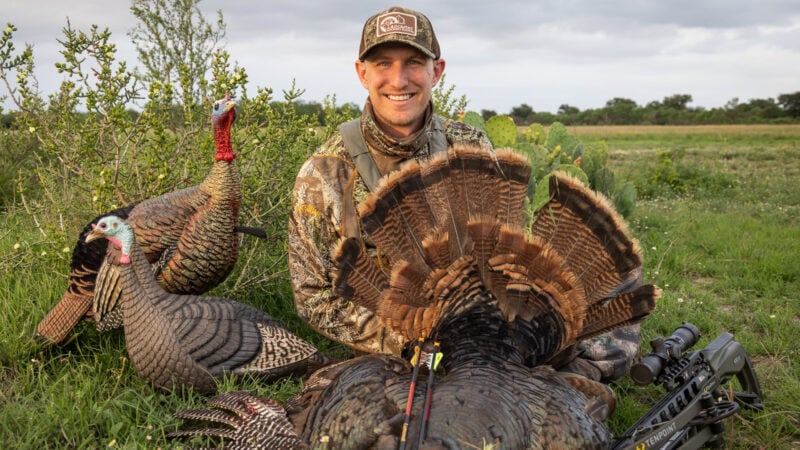
Keep Getting Up and Going
Some might say getting out of bed is hardly a tactic, but for many, it’s the biggest struggle in the late season. The turkeys have beat you down. You’re tired of the mosquitoes, ticks, snakes and everything else that’s out to get you. It’s easy to stay in bed in the late season. But it’s not the move to make if you still have a turkey tag in your pocket.
“My buddy slept in because he was tired, and there was a chance of rain,” said Josh Thrash, avid turkey hunter in Mississippi. “I figured there was also a chance it won’t be raining, so I went to the woods. It turned out to be a fine morning, and I killed my bird.”
The drive to keep going is half the battle. You have to keep getting up when that alarm goes off. Half-hearted turkey hunters won’t do it. The late season will quickly separate the men from the boys. You’ll often find the woods to be free from any hunting pressure in the late season. Keep getting up and going until the final buzzer goes off.
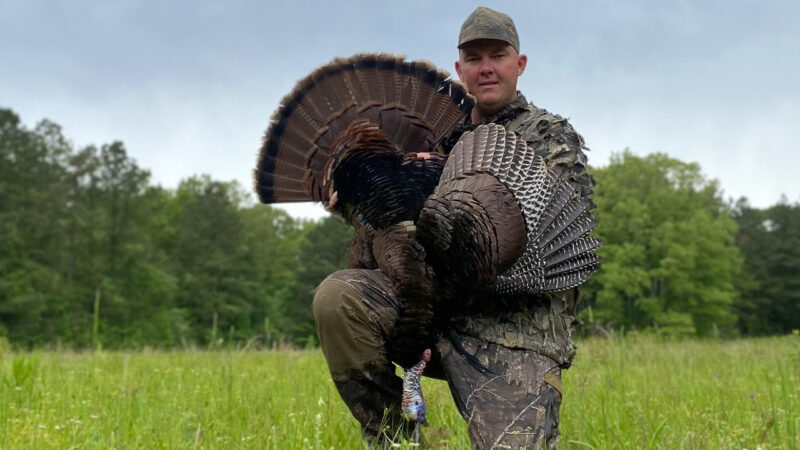
Less Calling, More Action
Keeping your call tucked down deep in your turkey vest ain’t a bad idea in the late season. Sure, you might need to let the local birds know where the party’s at, but then put it away, and deny the urge to call frequently. Turkeys are less vocal as the season rolls on. Both gobblers and hens seem to have less to say from the roost, and even less once on the ground.
Endless calling routines will do more harm than good at this time. It’s just not natural. Again, let them know you’re there, but then keep your calling routine soft and subtle. You’ll find that less can be more in the late season. Learn to rely less on your calls, and focus on making sets right in the middle of where your scouting and intel tells you all the action is taking place.
Change Up Your Decoys
Turkeys tend to respond differently to a variety of decoy presentations as the season wears on. The big, boastful strutter decoy that seemed to draw gobblers from a mile away, may do more harm than good in the late season.
“You have to be more selective of what decoy combination you’re using in the late season,” says Keith Polk of LandMax Properties. “A lot of the dominant gobblers have been killed, and the surviving gobblers are pretty wary in the late season. A strutter decoy at this time will likely send your bird running off.”
Consider subtle, less intimidating decoy options in the last days. A jake with a hen, or a lone feeder hen can work great in the late season. Avian-X even has interchangeable heads on a variety of their decoys to present a more/less aggressive pose.

Look For The Leftovers
The late season is a great time to find lonely birds in leftover locations that have managed to go unnoticed over the last few weeks. You’ll often find gobblers hanging out in some of the most unlikely places, closer to town, or the block of woods you never hunted all season long.
Turkeys spend their entire lives with one goal – survival. They’ll quickly learn the best place to hang out with minimal pressure. Find these locations, and you’ll have a great late season sit for a bird in the final days.

Take Their Temperature
Late season turkey hunting really comes down to a hunter’s ability to read a bird’s behavior. You need to develop your skills to the point of knowing how to take a gobbler’s temperature. Having the ability to gauge a bird’s attitude is priceless. Learn to read his gobbling frequency, volume and response time. Is he responding to your calls with ease, or do you have to jerk a gobble out of him with loud and excited calling?
“Turkeys will tell you what they want to hear,” says Jordan Barnes of the Close Proximity YouTube channel. “Calling comes down to reading their demeanor. It can change daily depending on the turkey you’re hunting.”
Learn to read a bird. The way he walks and the way he talks are all clues that’ll tell you what you need to know to make your next move.
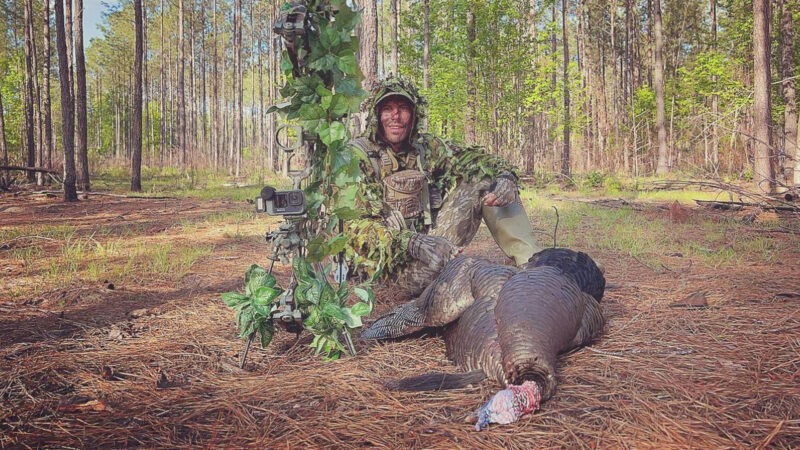
Blend In Better
By the late season, a lot of turkeys have seen every trick in the book thrown their way. They’ve had near death experiences all across the landscape. They may now be leery of the pop-up ground blind they once walked past without a care in the world. Their eyes seem to be working overtime as they pick apart every potential threat in the woods. The late season is a great time to ramp up your concealment efforts. You need to blend in better. You can do this by moving your blind to a new location and tucking it into the brush a bit rather than leaving it out in the wide open like you did in the early season.
Add a leafy shirt or ghillie suit to the mix when you’re not hunting from the blind. It’s a simple step that’ll help you melt into the landscape and fool the eyes of a wary gobbler.
Jordan Barnes adds artificial greenery to his bow (see photo above) to blend in better and break up his outline behind the bow. You can purchase such “foliage” at your local hobby shop and attach them with zip-ties.
What about you? What’s your favorite late season routine? Comment below, and let us know how you handle turkeys in the final days of the season.

 By
By 